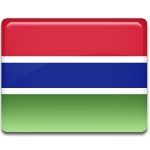Independence Day in the Gambia Date in the current year: February 18, 2026
 The Republic of The Gambia celebrates its Independence Day on February 18. On this day in 1965, The Gambia Independence Act came into force, making the country fully independent from Great Britain.
The Republic of The Gambia celebrates its Independence Day on February 18. On this day in 1965, The Gambia Independence Act came into force, making the country fully independent from Great Britain.The Gambia was the first West African nation to be conquered by the British and one of the last to gain independence from the British Empire. But before it became a British colony, it had been dominated by the Portuguese. They arrived in what is now the Gambia in the 15th century and took control of overseas trade.
In 1588, the claimant to the Portuguese throne, António, Prior of Crato, sold exclusive trade rights in the area along the Gambia River to English merchants. Three decades later, an English company was granted a royal charter for trade with the Gold Coast (now Ghana) and the Gambia.
However, Great Britain wasn’t the only colonial empire that had an interest in the region. During the late 17th century and throughout the better half of the 18th century, it fought with the French Empire for commercial and political supremacy in the regions of the Gambia River and Senegal River.
Great Britain got possession of the Gambia River in 1783 according to the First Treaty of Versailles. The French retained only a tiny enclave on the north bank of the river, but it was ceded to the United Kingdom in 1856. The Gambia formally became a separate colony within the British Empire in 1888. The next year, an agreement with France established the country’s present boundaries.
The Gambia was a British Crown colony. For administrative purposes, the city of Banjul (then Bathurst) and the surrounding area had the status of a colony, while the remainder of the territory of British Gambia had the status of a protectorate. In 1901, the colony received its own legislative and executive council, and began a gradual progression toward self-government.
After the Second World War, the colonial system began to collapse. Some former colonies had to fight for their independence, but the Gambia’s transition to an independent republic was peaceful and almost seamless. In the 1963, the colony was granted full internal-self governance. A year later, a constitutional conference was held, where the Gambian and British delegations agreed that the Gambia would become an independent country within the Commonwealth starting February 18, 1965.
The celebration of the Gambia’s independence was attended by the Duke and Duchess of Kent representing the Queen and guests from around 30 nations, greeted by the Prime Minister, the Governor, and Gambian chiefs. The independence was formally marked with lowering the Union Jack for the last time. It was replaced by the Gambian national flag, a horizontal tricolor of red, blue and green, separated by narrow white bands.
The main celebration of Independence Day is held at McCarthy square in the country’s capital of Banjul. It involves a procession of the army, civil servants, schoolchildren, teaches and others in front of the President and other dignitaries.
- Category
- Public Holidays
- Country
- Gambia
- Tags
- independence day in the gambia, holidays in the gambia, public holiday, national day